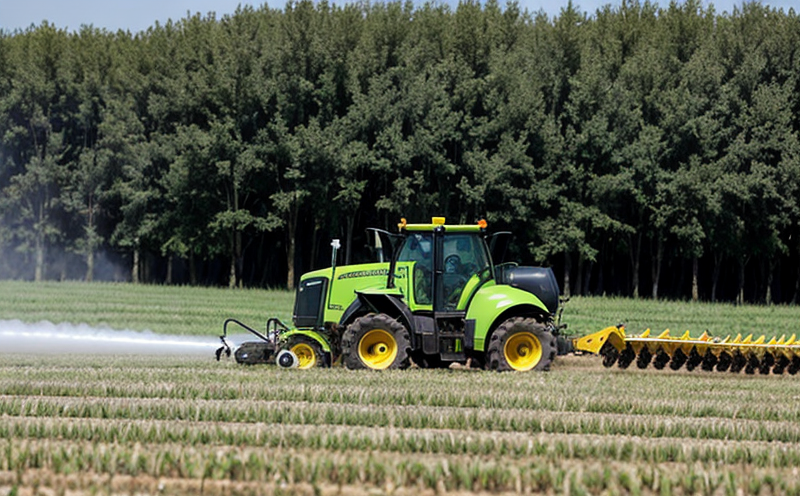Benomyl Residue Testing in Crops
The herbicide and fungicide residue testing service offered by Eurolab is a critical component of ensuring food safety and environmental sustainability. Benomyl, an organochlorine fungicide used primarily to control fungal diseases in crops such as potatoes, strawberries, and tomatoes, has been banned in many countries due to its potential toxicity to humans and the environment. Despite this ban, it remains essential for laboratories like Eurolab to provide accurate residue testing services to ensure compliance with international standards.
Benomyl can persist in soil and water bodies for years after use, posing a risk of contamination through runoff or leaching into groundwater. For this reason, agricultural producers, food processors, and regulatory authorities must adhere to strict guidelines regarding the allowable limits of benomyl residues in crops destined for human consumption. Eurolab employs state-of-the-art analytical techniques to detect even trace amounts of benomyl, ensuring that samples meet stringent international standards such as those set by ISO 18567:2013 and IEC 62496.
The testing process involves several steps, beginning with the collection of representative crop samples. These samples must be carefully stored under controlled conditions to avoid degradation or contamination before analysis. Once received at Eurolab, each sample undergoes thorough preparation, which may include extraction, cleanup, and derivatization processes tailored to optimize detection sensitivity.
Our laboratories utilize high-performance liquid chromatography (HPLC) coupled with mass spectrometry (MS/MS) for accurate quantification of benomyl residues. This approach ensures precise measurement down to parts per billion levels, providing reliable data that can be used by stakeholders in making informed decisions about compliance and safety.
Compliance with regulatory requirements is paramount when dealing with pesticides like benomyl. By offering this service, Eurolab supports the agricultural industry in maintaining high standards of food safety and environmental protection. Our commitment to accuracy, precision, and reliability makes us a trusted partner for businesses operating within the agricultural sector.
In addition to detecting benomyl residues, our services extend to supporting research and development efforts aimed at developing safer alternatives to traditional pesticides. Through rigorous testing protocols, we help clients identify potential sources of contamination early in their supply chains, ensuring that only safe and uncontaminated products reach market shelves.
Our expertise also extends beyond just analytical capabilities; Eurolab provides comprehensive support services including training programs for personnel involved in sample handling, interpretation of results, and implementation of corrective actions necessary to achieve compliance.
Why It Matters
The presence of benomyl residues in crops can have significant implications for both human health and the environment. Exposure to benomyl has been linked to adverse effects on reproductive systems, liver function, and thyroid hormones in laboratory animals. While no direct evidence exists linking these effects to human consumption, precautionary measures are necessary given its potential carcinogenic properties.
From an environmental perspective, persistent residues can disrupt natural ecosystems by affecting beneficial microorganisms present in soil and water bodies. This disruption not only impacts agricultural productivity but also threatens biodiversity within affected areas. Therefore, monitoring and controlling benomyl levels is crucial for preserving ecological balance.
The importance of residue testing cannot be overstated, especially considering the global nature of food trade. Consumers expect consistent quality and safety across borders, which necessitates harmonization of regulatory frameworks worldwide. By adhering to internationally recognized standards, countries can foster trust among trading partners while safeguarding public health interests domestically.
For producers and processors operating within these stringent regulations, accurate residue testing provides assurance that their products meet all necessary criteria for safe handling throughout the supply chain. This not only protects brand reputation but also facilitates smoother compliance with legal requirements.
Moreover, ongoing research into safer pesticides underscores the value of precise monitoring techniques such as those provided by Eurolab. Understanding how residues behave over time allows researchers to develop more effective control strategies and ultimately contribute towards reducing reliance on harmful chemicals.
Eurolab Advantages
EuroLab stands out in the field of residue testing for several reasons, making it an ideal choice for clients seeking reliable and accurate results. Our team comprises highly skilled professionals with extensive experience across various sectors, ensuring that we offer personalized attention to each client's unique needs.
We pride ourselves on providing rapid turnaround times without compromising on quality, allowing our customers to receive timely feedback crucial for decision-making processes. With advanced laboratory facilities equipped with cutting-edge technology, including the latest chromatography systems and automated data processing software, Eurolab guarantees consistent accuracy in all analyses conducted.
Our commitment to excellence extends beyond just technical proficiency; we prioritize excellent customer service throughout every stage of interaction from initial consultation through final report delivery. By fostering open communication channels between clients and our experts, EuroLab ensures that no detail goes unnoticed during the testing process.
In addition to standard offerings, Eurolab offers customized solutions tailored specifically towards individual client requirements. Whether it's developing new methods or enhancing existing ones, we work closely with partners to ensure their specific goals are met effectively.
Environmental and Sustainability Contributions
EuroLab plays a pivotal role in promoting environmental sustainability by helping eliminate harmful residues from agricultural products before they reach consumers. By accurately detecting benomyl levels, we assist growers in identifying contaminated batches early on so that corrective measures can be taken promptly.
The reduction of pesticide usage contributes significantly towards minimizing pollution risks associated with runoff and leaching into nearby water sources. As a result, downstream ecosystems benefit from healthier aquatic environments free from toxic contaminants. Furthermore, by supporting safer alternatives through our research services, EuroLab helps drive innovation within the industry towards greener practices.
Through continuous monitoring efforts, we contribute to maintaining food safety standards globally while fostering trust among stakeholders involved in international trade. Our proactive approach ensures that only safe and uncontaminated products enter markets worldwide, thereby protecting public health interests.





